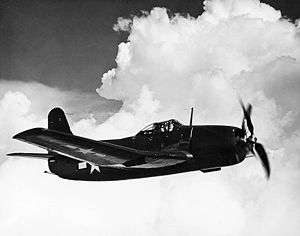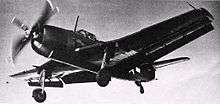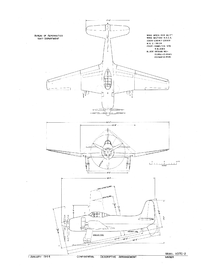Curtiss XBTC
| XBTC | |
|---|---|
 | |
| A Curtiss XBTC-2 "Model B" in 1946 | |
| Role | Attack aircraft |
| National origin | United States |
| Manufacturer | Curtiss Aeroplane and Motor Company |
| First flight | January 1945 (XBTC-2)[1] |
| Number built | 2[1] |
|
| |
The Curtiss XBTC was an experimental single-seat, single-engine torpedo bomber aircraft developed during World War II.[1]
Design and development

The Curtiss XBTC-1 (Model 96) was a low-wing monoplane with retractable tailwheel landing gear which was powered by a 2,200 hp (1,641 kW) Wright R-3350 radial engine. It was entered in a 1943 United States Navy competition against the Douglas XBT2D-1, Martin XBTM-1 Mauler, and Kaiser-Fleetwings XBTK-1. The BTC-2, powered by a Pratt & Whitney R-4360 engine, was given a higher priority due to problems with the Wright engine,[2] but despite its power and "first-class performance and weapon-carrying capacity",[3] it lost the competition to the XBT2D-1 (redesignated as the AD-1 Skyraider) and the BTM-1 (similarly redesignated AM-1) Mauler, which had already been built.[1]
Two XBTC-2s were built, each having a different wing. The "Model A" had a standard wing and flaps; the "Model B" featured a full-span Duplex flap wing with a straight trailing edge and a swept-back leading edge. Both had the 3,000 hp (2,237 kW) Pratt & Whitney XR-4360-8A equipped with contra-rotating propellers. The planes were delivered to the Naval Air Test Center at Naval Air Station Patuxent River, Maryland, in July 1946. One plane crashed in February 1947 the other in August 1947.[4]
The United States Army Air Forces assigned the designation A-40 to a proposed 'de-navalized' version of the XBTC; however, the USAAF decided not to acquire any further single-engine attack aircraft and the project was cancelled.[1]

Variants
- Curtiss XBTC-1 (Model 96) : Pratt & Whitney R-4360-14 engine
- Curtiss XBTC-2 (Model 96) : Pratt & Whitney XR-4360-8A engine
- Curtiss XBT2C-1 (Model 98) : Wright R-3350-24 engine
Operators
Specifications (XBTC-2)

Data from Curtiss Aircraft 1907–1947[5]
General characteristics
- Crew: one
- Length: 39 ft 0 in (11.89 m)
- Wingspan: 50 ft 0 in (15.24 m)
- Height: 12 ft 11 in (3.94 m)
- Wing area: 425 sq ft (39.5 m2)
- Empty weight: 13,410 lb (6,083 kg)
- Gross weight: 21,660 lb (9,825 kg) with one Mk 13 torpedo
- Powerplant: 1 × Pratt & Whitney R-4360-8A Wasp Major radial engine, 3,000 hp (2,200 kW)
- Propellers: 6-bladed Curtiss Electric contra-rotating propeller, 14 ft 2 in (4.32 m) diameter
Performance
- Maximum speed: 374 mph (602 km/h; 325 kn) at 16,000 ft (4,900 m)
- Cruise speed: 188 mph (163 kn; 303 km/h)
- Range: 1,835 mi (1,595 nmi; 2,953 km) at 188 mph (303 km/h)
- Service ceiling: 26,200 ft (7,986 m)
- Rate of climb: 2,250 ft/min (11.4 m/s)
Armament
- Guns: 4 × 20mm cannon
- Missiles: One torpedo
- Bombs: Up to 2,000 pounds (910 kg)
See also
- Related development
- Aircraft of comparable role, configuration and era
- Related lists
References
- Notes
- 1 2 3 4 5 6 Kowalski, Bob (2007). Curtiss XBTC-2 Eggbeater. Naval Fighters. Number Seventy-Seven. California: Steve Ginter. ISBN 0 942612 77 9.
- ↑ U.S. Naval Aviation News November–December 1987, p.16
- ↑ Donald, David, general editor. Encyclopedia of World Aircraft (Etobicoke, Ontario: Prospero Books, 1997), p.293, "Curtiss Model 96/98 (XBTC/XBT2C)".
- ↑ U.S. Naval Aviation News November–December 1987, p.17
- ↑ Bowers 1979, p. 446.
- ↑ Fey, Tom (16–18 July 2009). "The Short but Interesting Life of the Aeroproducts Dual-Rotation Propeller" (PDF). USA: www.enginehistory.org. Retrieved 16 May 2012.
- Bibliography
- Andrews, Hal. "XBTC-2". Naval Aviation News. November–December 1987. pp. 16–17.
- Bowers, Peter M. Curtiss Aircraft 1907–1947. London:Putnam, 1979. ISBN 0-370-10029-8.
- Donald, David, general editor. Encyclopedia of World Aircraft. Etobicoke, Ontario: Prospero Books, 1997. ISBN 1-85605-375-X.
- Kowalski, Bob (2007). Curtiss XBTC-2 Eggbeater. Naval Fighters. Number Seventy-Seven. California: Steve Ginter. ISBN 0 942612 77 9.
- Fey, Tom (16–18 July 2009). "The Short but Interesting Life of the Aeroproducts Dual-Rotation Propeller" (PDF). USA: www.enginehistory.org. Retrieved 16 May 2012.
External links
| Wikimedia Commons has media related to Curtiss BTC. |